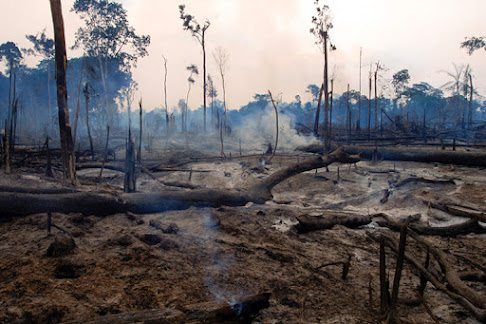WHY OUR FORESTS ARE BURNING.?
Wildfire smoke is a mixture of hazardous air pollutants, such PM2.5, NO2, ozone, aromatic hydrocarbons, or lead. In addition to contaminating the air with toxic pollutants, wildfires also simultaneously impact the climate by releasing large quantities of carbon dioxide and other greenhouse gases into the atmosphere.
With climate change leading to warmer temperatures and drier conditions and the increasing urbanization of rural areas, the fire season is starting earlier and ending later. Wildfire events are getting more extreme in terms of acres burned, duration and intensity, and they can disrupt transportation, communications, water supply, and power and gas services.
Wildfires can start with a natural occurrence—such as a lightning strike—or a human-made spark. However, it is often the weather conditions that determine how much a wildfire grows. Wind, high temperatures, and little rainfall can all leave trees, shrubs, fallen leaves, and limbs dried out and primed to fuel a fire. Topography plays a big part too: flames burn uphill faster than they burn downhill.
*SLASH AND BURN DEFORESTATION: The vast majority of the fires in the Amazon and Indonesia are manmade and intentional—the result of illegal deforestation and clearing of farmland. Wildfires are in fact quite rare in tropical rainforests, due to the high humidity. Even in the dry season, the flora is usually too wet for lightning to spark a blaze or for accidental fires (from a burning campfire or cigarette) to take hold.
Wildfires are a natural part of many forest ecosystems, often playing a vital role in their life cycle of renewal. The giant redwoods of California, for example, rely on periodic fires (natural or man-made) to clear undergrowth and germinate their seeds.
Throughout the ages, many farming communities around the world have responsibly used controlled burning to manage their lands. Satellite images currently depict fires across vast swaths of forests in Central Africa—but experts note that these are part of a traditional cycle of burning managed by farmers to stimulate new growth in the savanna.
The current climate crisis, however, has multiplied the likelihood of both wildfires and traditional burning cycles spinning quickly out of control. Rising temperatures and extreme heat dry out ecosystems to the point of extreme vulnerability. Alarmingly, the Arctic—which is warming twice as fast as the rest of the planet—saw a dramatic increase in wildfires this summer, from eastern Siberia to Alaska and Greenland.
THANKS YOU & FOLLOW FOR MORE UPDATES..!






No comments:
Post a Comment